Garden Maintenance in Spitalfields
Introduction to Garden Maintenance
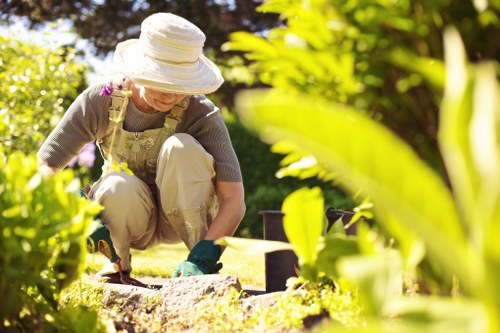
Maintaining a beautiful garden requires dedication, knowledge, and the right resources. In the heart of London, Spitalfields boasts a vibrant community of garden enthusiasts who take pride in their green spaces. Whether you are a seasoned gardener or a beginner, understanding the essentials of garden maintenance in Spitalfields can help you achieve a flourishing garden year-round.
Spitalfields is known for its diverse range of garden styles, from classic English gardens to modern urban green spaces. The unique climate and urban environment present both opportunities and challenges for garden maintenance. By leveraging local expertise and tailored strategies, gardeners in Spitalfields can create and sustain stunning outdoor areas.
In this article, we will explore the key aspects of garden maintenance specific to Spitalfields, providing you with actionable tips and resources to keep your garden in prime condition.
Understanding the Local Climate
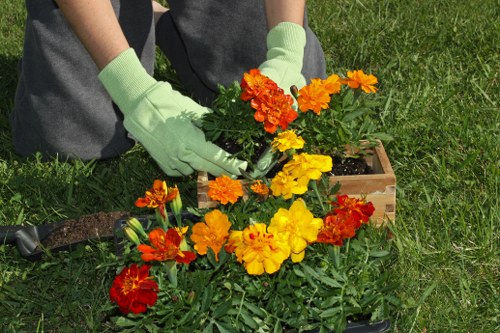
The local climate plays a significant role in determining the types of plants that will thrive in your garden. Spitalfields, situated in East London, experiences a temperate maritime climate, characterized by mild winters and warm summers. Understanding these climatic conditions is essential for selecting appropriate plant species and scheduling maintenance activities.
**Temperature** fluctuations can affect plant growth cycles. During the summer months, ensuring adequate watering is crucial to prevent drought stress, while in winter, protection against occasional frost may be necessary for sensitive plants.
**Rainfall** is relatively evenly distributed throughout the year, but peak periods can lead to waterlogging. Implementing proper drainage systems can mitigate these issues, ensuring that plants receive the right amount of moisture without becoming waterlogged.
Soil Preparation and Health
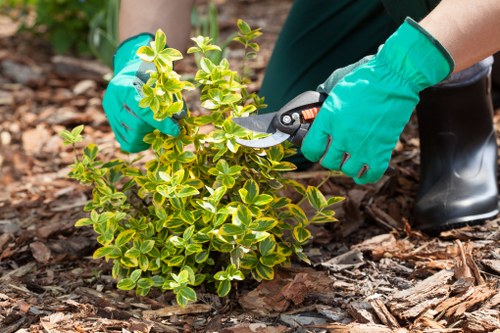
Testing and Improving Soil Quality
Healthy soil is the foundation of a thriving garden. Conducting a soil test in Spitalfields can help you understand the pH level, nutrient content, and texture of your garden soil. This information is critical for selecting the right amendments to improve soil fertility.
Steps to Test Your Soil:
- Collect soil samples from different areas of your garden.
- Use a home soil testing kit or send samples to a local laboratory.
- Analyze the results to determine necessary adjustments.
Based on the test results, you may need to add organic matter, such as compost or manure, to enhance soil structure and nutrient content. Additionally, adjusting the pH level can create a more conducive environment for plant growth.
Plant Selection and Care
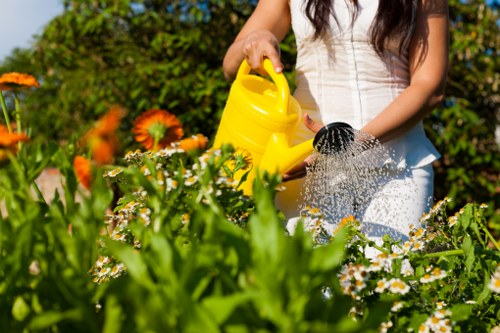
Choosing the Right Plants
Selecting plants that are well-suited to the Spitalfields climate ensures lower maintenance and healthier growth. Opt for native species and those adapted to urban conditions. Some popular choices in Spitalfields include:
- Lavender – thrives in well-drained soil and adds fragrance.
- Hydrangeas – provide vibrant blooms and require moderate care.
- Hostas – ideal for shaded areas and offer lush foliage.
Planting Techniques
Proper planting techniques can significantly impact plant health. Ensure that each plant is placed at the right depth, with adequate spacing to promote air circulation and reduce the risk of disease.
Watering and Fertilizing
Regular watering schedules are essential, especially during dry spells. Using drip irrigation systems can provide consistent moisture while conserving water. Fertilizing should be done based on plant needs and soil test results to avoid over-fertilization.
Pest and Disease Management
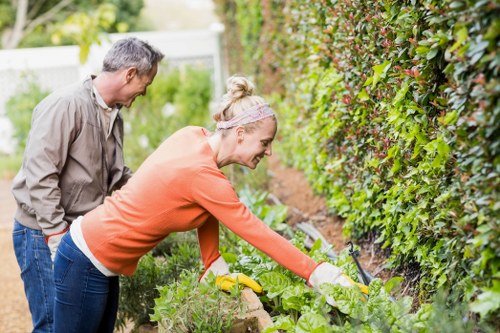
Identifying Common Pests
Pests can pose a significant threat to garden health. In Spitalfields, common garden pests include aphids, slugs, and snails. Early detection and management are key to preventing infestations.
Natural Pest Control Methods
Employing natural pest control methods can minimize the need for chemical interventions. Introducing beneficial insects like ladybugs and using barrier methods such as copper tape can help protect plants from unwanted pests.
Managing Plant Diseases
Fungal diseases, such as powdery mildew and rust, can affect a variety of plants. Maintaining good air circulation, proper spacing, and using resistant plant varieties are effective strategies for disease prevention.
Lawn Care Tips

Maintaining a Healthy Lawn
A well-maintained lawn enhances the overall appearance of your garden. Regular mowing, watering, and fertilizing are essential practices. In Spitalfields, it's important to mow at the right height to encourage deep root growth and reduce weed proliferation.
Seasonal Lawn Care
Adjust your lawn care routine based on the season. In spring, focus on dethatching and aeration to promote healthy growth. During the summer, ensure consistent watering, and in autumn, prepare the lawn for winter by applying a final mow and aerating the soil.
Choosing the Right Grass Type
Selecting a grass type that is well-suited to Spitalfields conditions, such as perennial ryegrass or fescues, can lead to a more resilient and low-maintenance lawn.
Hardscaping and Garden Structures

Incorporating Hardscaping Elements
Hardscaping features like pathways, patios, and garden walls add structure and functionality to your garden. When designing these elements in Spitalfields, consider the available space and how you intend to use the garden.
Choosing Materials
Select durable materials that complement your garden's aesthetic. Options include natural stone, brick, and timber, each offering distinct visual and functional benefits.
Maintaining Garden Structures
Regular maintenance of hardscaping elements ensures their longevity. This includes cleaning surfaces, checking for damage, and repairing any wear and tear promptly.
Seasonal Garden Maintenance

Spring Maintenance Tips
Spring is a crucial time for rejuvenating your garden. Begin by clearing any debris from winter, pruning dead branches, and preparing beds for new plantings.
Summer Care Strategies
During the warmer months, focus on consistent watering, mulching to retain soil moisture, and controlling pests. Regularly deadheading flowers encourages continuous blooming.
Autumn Preparation
As temperatures drop, prepare your garden by planting autumn blooms, raking fallen leaves, and protecting sensitive plants from frost. This ensures your garden remains vibrant and healthy.
Hiring Professional Garden Maintenance Services

Benefits of Professional Services
While DIY garden maintenance is feasible, hiring professional services in Spitalfields offers several advantages. Professionals bring expertise, save time, and ensure that your garden receives comprehensive care.
Choosing the Right Service Provider
Select a reputable garden maintenance company with experience in Spitalfields. Look for providers who offer a range of services, including pruning, planting, lawn care, and pest management.
Cost Considerations
Investing in professional garden maintenance can be cost-effective in the long run. Consider factors such as service packages, frequency of visits, and the specific needs of your garden when budgeting.
Sustainable Gardening Practices

Eco-Friendly Gardening Tips
Adopting sustainable practices not only benefits the environment but also enhances the health of your garden. Implementing techniques such as composting, rainwater harvesting, and using organic fertilizers can lead to a more resilient garden.
Composting
Creating a compost bin in your garden allows you to recycle kitchen and garden waste into nutrient-rich soil amendments. This reduces landfill waste and provides natural fertilizer for your plants.
Water Conservation
Using mulch, installing drip irrigation systems, and selecting drought-resistant plants are effective ways to conserve water in your garden. These practices ensure that your garden remains lush without excessive water usage.
DIY Garden Maintenance Tips

Essential Tools for Gardeners
Having the right tools can make garden maintenance tasks easier and more efficient. Some essential tools for Spitalfields gardeners include:
- Pruning shears – for trimming and shaping plants.
- Garden gloves – to protect your hands during work.
- Spade and fork – for digging and aerating soil.
Basic Maintenance Tasks
Regular maintenance tasks such as weeding, deadheading, and fertilizing keep your garden in top condition. Allocating specific days for these tasks can help maintain consistency and prevent overgrowth.
Time-Saving Tips
Implementing time-saving strategies, such as using mulch to reduce weeding frequency and setting up automatic irrigation systems, can streamline your garden maintenance routine.
Community and Resources in Spitalfields

Local Gardening Clubs and Groups
Joining local gardening clubs and community groups in Spitalfields provides opportunities to share knowledge, access resources, and participate in community garden projects. These groups often host workshops, plant exchanges, and social events.
Educational Resources
Accessing educational resources such as classes, online tutorials, and gardening books can enhance your maintenance skills. Local nurseries and garden centers in Spitalfields often offer expert advice and personalized recommendations.
Support Networks
Building a support network with fellow gardeners can provide assistance during challenging seasons, share best practices, and inspire new ideas for your garden.
Conclusion

Effective garden maintenance in Spitalfields combines knowledge of local climate, soil health, plant selection, and sustainable practices. Whether you choose to maintain your garden yourself or hire professional services, staying informed and proactive is key to a thriving outdoor space.
Embrace the beauty and benefits of a well-maintained garden by implementing the tips and strategies outlined in this guide. With dedication and the right resources, your Spitalfields garden can become a lush, vibrant sanctuary.
Contact us today to learn more about our garden maintenance services and start transforming your garden into the haven you've always desired.